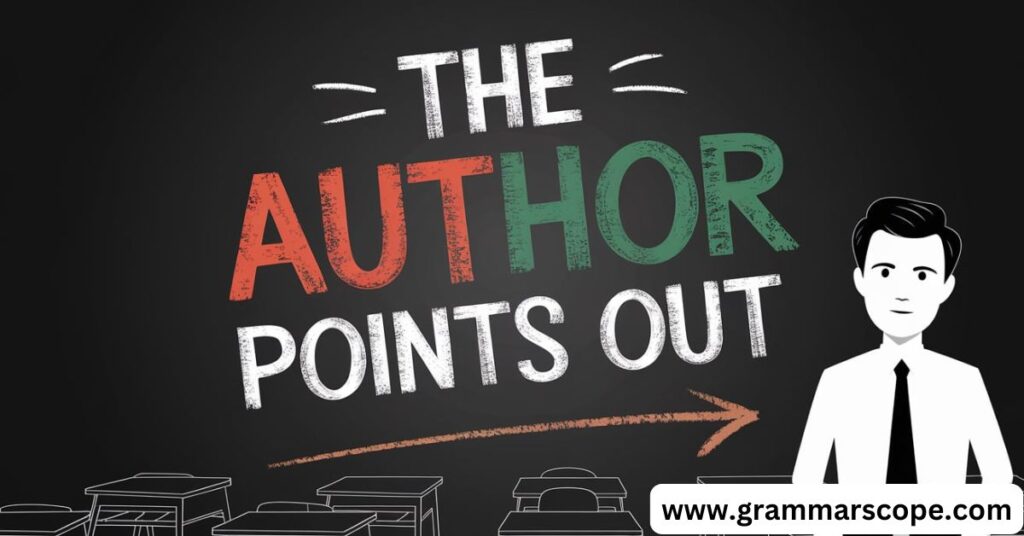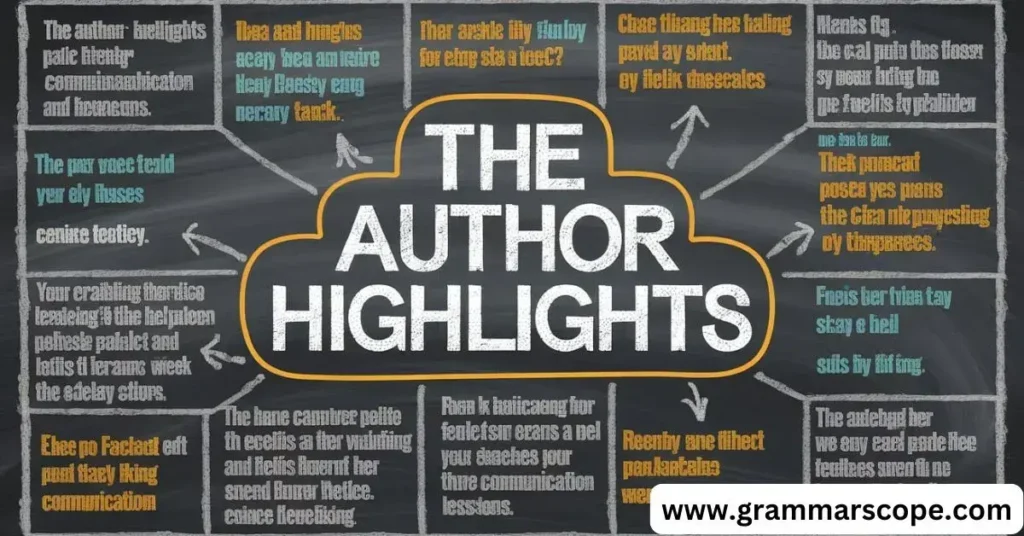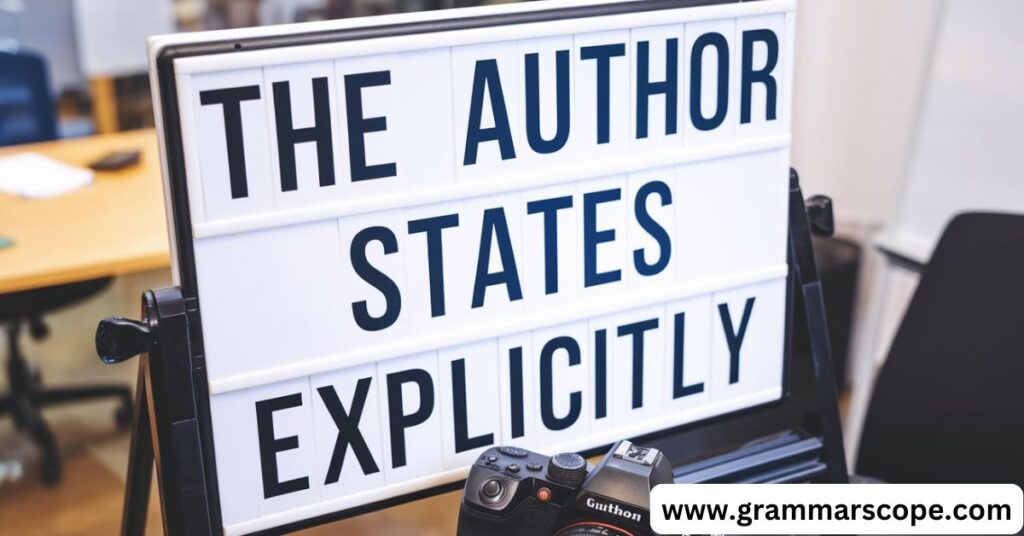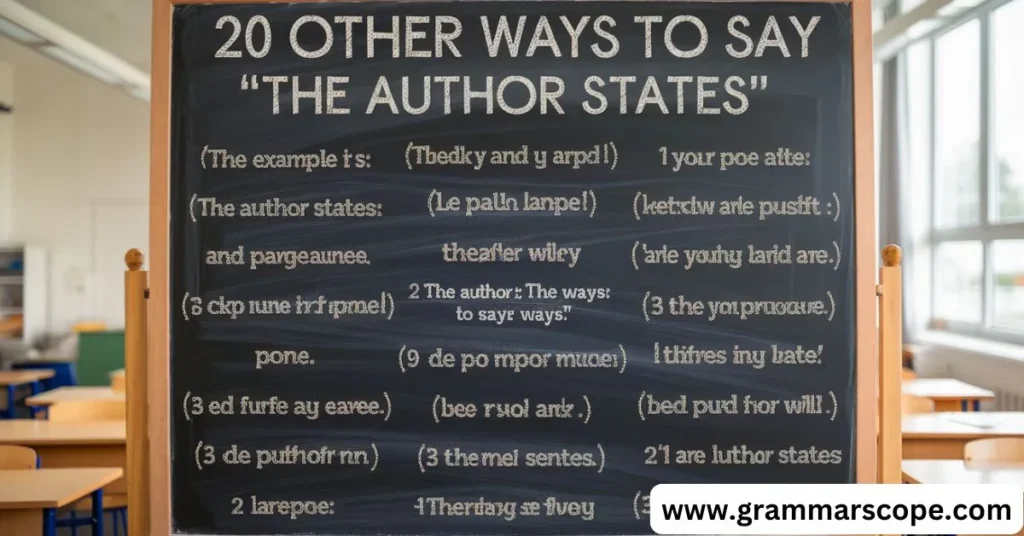The author states is a common phrase often used in academic and professional writing, but have you ever wondered if there’s a better way to convey the same meaning? Using varied language not only keeps your writing fresh but also makes it more engaging and professional. Whether you’re writing an email, drafting a report, or analyzing literature, finding alternatives to this phrase can elevate your expression.
Exploring synonyms for “the author states” allows you to adapt your tone and message to suit your audience. Whether you aim to sound assertive, analytical, or conversational, having a list of alternate phrases gives you the flexibility you need. Plus, using alternatives can help avoid repetition in longer pieces of writing, keeping your audience interested.
In this article, we’ll dive into 20 other ways to say “the author states,” complete with scenario-based examples to show how you can use these phrases effectively. From academic discussions to casual correspondence, these options will enhance your writing and make it stand out. Let’s explore these practical alternatives!
Is It Okay to Say “The Author States”?
While it’s perfectly acceptable to use “the author states” in your writing, overusing it can make your text sound monotonous. Relying on a single phrase can also limit your ability to express nuanced ideas. Using synonyms for “the author states” like “the author claims” or “the author points out” provides clarity while maintaining a professional tone.
Additionally, certain contexts may demand alternatives. For example, in an academic paper, a phrase like “the author argues” might be more suitable when referring to a debated point, whereas “the author suggests” fits better for subtle or implied ideas.
What to Say Instead of “The Author States”
- The Author Argues
- The Author Suggests
- The Author Claims
- The Author Asserts
- The Author Proposes
- The Author Points Out
- The Author Maintains
- The Author Concludes
- The Author Remarks
- The Author Notes
- The Author Emphasizes
- The Author Highlights
- The Author Explains
- The Author Observes
- The Author Reflects
- The Author Warns
- The Author Implies
- The Author States Explicitly
- The Author Discusses
- The Author Examines
20 Other ways to say “The Author States”
Here are 20 Other ways to say “The Author States”:
1. The Author Argues

This phrase is ideal for contexts where the author presents a compelling case or engages in debate.
Example (Academic Setting):
In his book, The Economics of Change, the author argues that government intervention is necessary to stabilize markets during economic downturns.
Scenario (Email):
Hi Sarah,
While reviewing the attached document, I noticed the author argues that team collaboration drives innovation. Let me know your thoughts.
2. The Author Suggests
Use this when the author proposes an idea without strong emphasis.
Example (Literature Analysis):
In her novel, the author suggests that true happiness comes from within, rather than external achievements.
Scenario (Memo):
Dear Team,
The report suggests implementing quarterly reviews to enhance productivity. Please share feedback by Monday.
3. The Author Claims
Best for situations where the statement needs verification or can be contested.
Example (Research Paper):
The author claims that this new algorithm outperforms all existing methods in terms of speed and accuracy.
Scenario (Discussion):
Hi Mark,
During the presentation, the author claims their approach is cost-effective. Should we verify this with additional data?
4. The Author Asserts
This is a stronger phrase, used when the author takes a firm stance.
Example (Philosophy Essay):
In Existentialism and Freedom, the author asserts that personal choice defines one’s essence.
Scenario (Email):
Hi Olivia,
The attached article asserts that remote work increases employee satisfaction. Let’s discuss this in our next meeting.
5. The Author Proposes
Ideal for formal suggestions or recommendations.
Example (Business Analysis):
In the whitepaper, the author proposes a new framework for sustainable development.
Scenario (Client Email):
Hi Alex,
The author proposes using cloud-based solutions for better scalability. Let me know if you’d like more details.
6. The Author Points Out

Use this when highlighting a specific observation or fact.
Example (Scientific Report):
The author points out that temperature fluctuations impact plant growth significantly.
Scenario (Email):
Hi Jason,
The author points out that regular updates can improve user experience. Let’s incorporate this into our strategy.
7. The Author Maintains
This phrase is suitable for ongoing or consistent beliefs.
Example (Historical Analysis):
Throughout his essays, the author maintains that education is the cornerstone of democracy.
Scenario (Internal Memo):
Hi Team,
The report maintains that customer satisfaction should remain our top priority. Let’s align our efforts accordingly.
8. The Author Concludes
Perfect for summarizing the author’s final thoughts or findings.
Example (Conclusion Section):
In her research, the author concludes that early detection is crucial for effective treatment.
Scenario (Report Email):
Hi Emily,
The study concludes that renewable energy adoption could reduce costs by 20%. Shall we explore this further?
9. The Author Remarks
Use this for informal or reflective statements.
Example (Literary Critique):
The author remarks on the fleeting nature of time through vivid imagery and metaphors.
Scenario (Email):
Hi Lisa,
The article remarks on the importance of maintaining work-life balance. I think this aligns with our company values.
10. The Author Notes
Great for emphasizing specific points or observations.
Example (Journal Analysis):
In the introduction, the author notes that technological advancements have reshaped communication.
Scenario (Email):
Hi Noah,
The report notes that market trends are shifting toward eco-friendly products. Let’s prepare accordingly.
11. The Author Emphasizes
This phrase is used when the author stresses a particular point or idea.
Example (Academic Setting):
In her essay, the author emphasizes the role of empathy in fostering meaningful connections.
Scenario (Email):
Hi Claire,
The report emphasizes the importance of timely communication in project management. Let’s ensure our deadlines are clear to everyone.
12. The Author Highlights

Use this when the author draws attention to specific information.
Example (Research Article):
The author highlights the correlation between physical activity and mental health improvement.
Scenario (Report Summary):
Hi Team,
The presentation highlights key strategies for reducing operational costs. Let’s discuss these during our meeting.
13. The Author Explains
Best for situations where the author clarifies or elaborates on a concept.
Example (Literary Review):
In the preface, the author explains the inspiration behind her groundbreaking research.
Scenario (Email):
Hi Tom,
The article explains the step-by-step process of implementing this framework. Let me know if you’d like me to break it down further.
14. The Author Observes
Perfect for pointing out thoughtful insights or reflections.
Example (Book Analysis):
In his memoir, the author observes how cultural shifts influence individual identity.
Scenario (Team Memo):
Hi Everyone,
The author observes that market volatility has increased over the last quarter. We should account for this in our forecasts.
15. The Author Reflects
This is suitable for introspective or contemplative observations.
Example (Personal Essay):
The author reflects on her journey of self-discovery throughout the narrative.
Scenario (Personal Email):
Hi Julia,
The article reflects on the challenges of balancing personal and professional life. I found it quite relatable—hope you do too!
16. The Author Warns
Use this when the author issues a caution or raises concerns.
Example (Policy Paper):
The author warns that unchecked climate change could have catastrophic effects on biodiversity.
Scenario (Project Proposal):
Hi Marcus,
The author warns about the potential risks associated with this approach. We should evaluate these further before proceeding.
17. The Author Implies
This phrase works well for indirect suggestions or subtle points.
Example (Critical Analysis):
The author implies that societal norms often hinder individual freedom.
Scenario (Email):
Hi Emma,
The attached document implies that improving team collaboration could lead to better results. Let’s explore this idea in our meeting.
18. The Author States Explicitly

This is ideal when the author makes a clear and direct declaration.
Example (Scientific Report):
The author states explicitly that the study’s findings are limited to urban populations.
Scenario (Formal Email):
Dear Dr. Smith,
The author states explicitly that these guidelines are applicable only under specific conditions. Let me know if you’d like me to clarify further.
19. The Author Discusses
Great for a broader or in-depth exploration of a topic.
Example (Journal Article):
The author discusses the ethical implications of artificial intelligence in healthcare.
Scenario (Internal Memo):
Hi All,
The author discusses several innovative approaches to team management. Let’s review these ideas in the upcoming workshop.
20. The Author Examines
Use this when the author analyzes or investigates a subject in detail.
Example (Case Study):
The author examines the impact of social media on consumer behavior.
Scenario (Email):
Hi Laura,
The report examines the pros and cons of adopting this new technology. Let’s schedule a meeting to review the findings.
Pro Tips for Using Alternatives
Choose the right alternative for the context. For example, “the author argues” fits better in formal debates, while “the author notes” works for general observations.
Mix and match phrases. Avoid sticking to one or two alternatives throughout your piece to maintain variety and engagement.
Ensure clarity. Some synonyms may slightly alter the meaning, so always double-check that your choice aligns with the intended message.
Frequently Asked Question
What is another way to say the author states?
Another way to say “the author states” is “the author asserts.”
Which words show that the author is giving an example?
Words that show the author is giving an example include:
- For instance
- For example
- Such as
- Namely
- In particular
- Specifically
- As illustrated by
- To demonstrate
- As shown by
- Including
What are different ways to say the author shows?
Here are different ways to say “the author shows”:
- The Author Demonstrates
- The Author Highlights
- The Author Illustrates
- The Author Explains
- The Author Points Out
- The Author Depicts
- The Author Reveals
- The Author Portrays
- The Author Emphasizes
- The Author Exhibits
Conclusion
Finding another way to say “the author states” not only enriches your writing but also allows you to connect better with your audience. Whether you choose “the author suggests,” “the author claims,” or another synonym, these phrases add depth and precision to your communication.
By incorporating these alternatives into your writing, you’ll keep your language fresh and engaging. The next time you find yourself typing “the author states,” consider trying one of these creative options instead!

Emma Olivia is an experienced blogger and the creative mind behind Grammar Scope. With a passion for language and years of writing expertise, she crafts engaging, informative content that simplifies grammar and writing tips for readers worldwide. Emma’s dedication to clear communication and love for the written word shine through every article she publishes, making Grammar Scope a trusted resource for language enthusiasts and learners alike.






